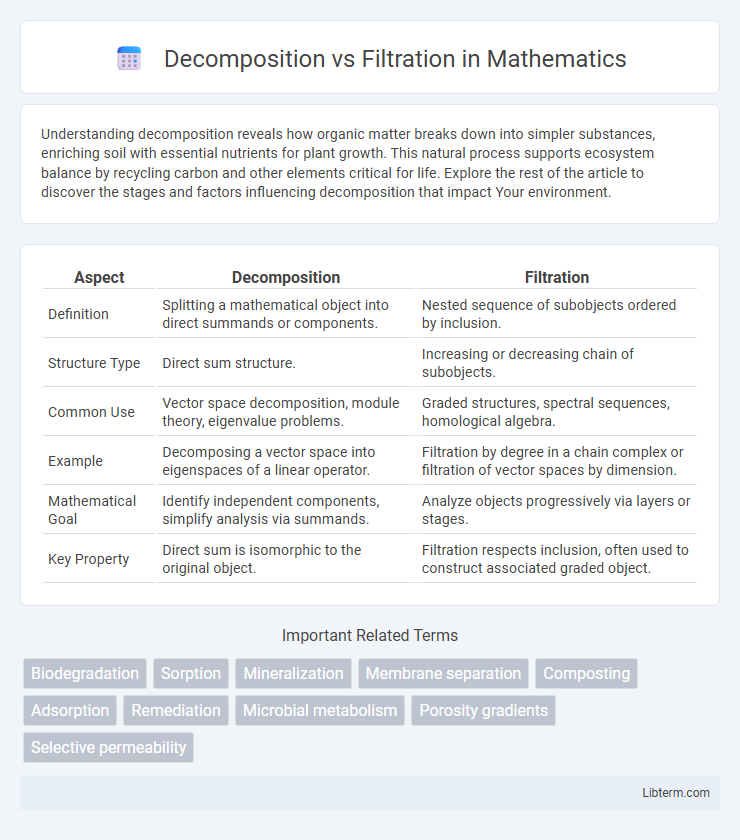Understanding decomposition reveals how organic matter breaks down into simpler substances, enriching soil with essential nutrients for plant growth. This natural process supports ecosystem balance by recycling carbon and other elements critical for life. Explore the rest of the article to discover the stages and factors influencing decomposition that impact Your environment.
Table of Comparison
| Aspect | Decomposition | Filtration |
|---|---|---|
| Definition | Splitting a mathematical object into direct summands or components. | Nested sequence of subobjects ordered by inclusion. |
| Structure Type | Direct sum structure. | Increasing or decreasing chain of subobjects. |
| Common Use | Vector space decomposition, module theory, eigenvalue problems. | Graded structures, spectral sequences, homological algebra. |
| Example | Decomposing a vector space into eigenspaces of a linear operator. | Filtration by degree in a chain complex or filtration of vector spaces by dimension. |
| Mathematical Goal | Identify independent components, simplify analysis via summands. | Analyze objects progressively via layers or stages. |
| Key Property | Direct sum is isomorphic to the original object. | Filtration respects inclusion, often used to construct associated graded object. |
Introduction to Decomposition and Filtration
Decomposition involves breaking down complex substances or data into simpler components to facilitate analysis or processing, commonly used in chemical, environmental, and data science contexts. Filtration refers to the process of separating particles from a fluid or mixture based on size or phase differences, widely applied in water treatment, air purification, and laboratory procedures. Both techniques play crucial roles in scientific research and industrial applications by enhancing the clarity and usability of materials or information.
Defining Decomposition in Environmental Processes
Decomposition in environmental processes refers to the biological breakdown of organic matter by microorganisms, fungi, and bacteria, transforming complex organic compounds into simpler substances like carbon dioxide, water, and nutrients. This natural process plays a crucial role in nutrient cycling, soil fertility, and ecosystem sustainability by releasing essential elements back into the environment. In contrast, filtration involves the physical removal of particles or contaminants from air, water, or other fluids without chemical alteration.
Understanding Filtration Mechanisms
Filtration mechanisms involve physical separation processes where particles are retained on or within a porous medium based on size, shape, or affinity, enabling efficient removal of contaminants from fluids. Understanding the interaction between filter media pore structure and particle characteristics is essential for optimizing filtration efficiency and selectivity. Filtration contrasts with decomposition, which breaks down substances chemically, highlighting the significance of mechanical versus chemical processes in purification systems.
Key Differences Between Decomposition and Filtration
Decomposition is the process by which organic matter breaks down into simpler compounds by microbial or chemical activity, while filtration physically separates solids from fluids using a porous barrier or filter medium. Decomposition involves chemical changes that alter the original material, whereas filtration only removes particles without changing their chemical composition. Key differences include decomposition's role in nutrient cycling and biochemical transformations, contrasting with filtration's primary function of clarifying liquids or gases.
Biological vs. Physical Methods: An Overview
Decomposition in biological methods involves the breakdown of organic matter by microorganisms, enabling nutrient recycling and soil fertility enhancement. Filtration, a physical method, removes suspended particles and impurities from liquids or gases using barriers such as membranes or filters. Understanding the contrast between microbial-driven decomposition and mechanical filtration is essential for applications in environmental management and water treatment.
Applications of Decomposition in Waste Management
Decomposition plays a crucial role in waste management by facilitating the breakdown of organic materials into simpler compounds, enabling efficient composting processes that reduce landfill usage and greenhouse gas emissions. Microbial decomposition accelerates the conversion of biodegradable waste into nutrient-rich compost, which enhances soil fertility and supports sustainable agriculture. This biological approach complements filtration methods by targeting organic pollutants that filtration systems may not adequately remove, promoting a holistic waste treatment strategy.
Filtration Technologies in Water and Air Purification
Filtration technologies in water and air purification employ physical or chemical processes to capture and remove contaminants, including particulate matter, microorganisms, and chemical pollutants. Common filtration methods include membrane filtration, activated carbon filters, and HEPA filters, each optimized for specific contaminants and operational environments. Advanced filtration systems enhance water and air quality by improving efficiency in removing toxins, pathogens, and allergens while maintaining energy efficiency and minimizing maintenance requirements.
Advantages and Limitations of Decomposition
Decomposition efficiently breaks down complex organic matter into simpler compounds, enhancing nutrient recycling and reducing waste volume. It is advantageous for natural soil enrichment and maintaining ecosystem balance but is limited by slower processing times and sensitivity to environmental conditions such as temperature and moisture. Unlike filtration, decomposition does not physically separate contaminants, making it unsuitable for immediate purification tasks.
Strengths and Weaknesses of Filtration Systems
Filtration systems excel at removing solid particles, microorganisms, and contaminants from liquids and gases, providing clear and purified outputs essential for industries such as water treatment, pharmaceuticals, and food processing. However, their effectiveness is limited by filter pore size, often unable to eliminate dissolved substances or gases, and filters can clog or degrade over time, necessitating regular maintenance and replacement. Compared to decomposition methods, filtration offers faster processing and immediate separation but lacks the capacity to chemically break down pollutants or organic matter.
Choosing the Right Method: Decomposition or Filtration?
Choosing between decomposition and filtration depends on the material composition and the desired outcome of the process. Decomposition is ideal for breaking down complex organic compounds through chemical or biological reactions, while filtration effectively separates particles based on size or phase without altering the chemical structure. Evaluating factors such as impurity type, process efficiency, and end-product requirements ensures the selection of the most suitable method for contamination removal or purification.
Decomposition Infographic

 libterm.com
libterm.com